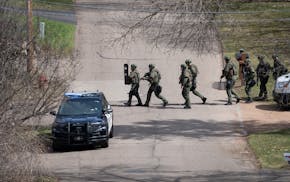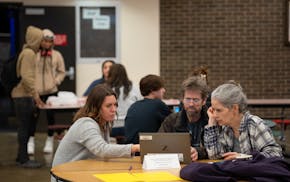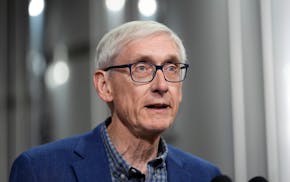Human trafficking and counterfeit stings yielded more than 110 arrests ahead of the Super Bowl, officials announced Tuesday.
A human trafficking operation succeeded in arresting 94 perpetrators, officials said. Counterfeiting sweeps led to the seizure of more than a half-million dollars in fake merchandise.
The trafficking sting, called Operation Guardian Angel, included federal agents, local police departments and advocacy groups, among others that spent several years preparing for Super Bowl LII.
Data from the effort contradict the idea that the Super Bowl is the nation's largest sex trafficking event, said Minneapolis Police Sgt. Grant Snyder.
Research suggests that events like the state's fishing season opener or deer hunting opener increase human trafficking regionally more than large events like the Super Bowl.
Operation Guardian Angel received 1,560 individual responses to decoy ads over the 11-day period.
More than half those arrested were people of color, while in the past those arrested were primarily white, Snyder said. This could mean that the anti-sex trafficking campaigns — primarily aimed at Minnesota's white, suburban residents — are not serving communities of color, he said.
Most of the men arrested had no criminal history, Snyder said. This came as a surprise.
"We thought we were going to be arresting the worst of the worst — the sociopaths, the sex addicts, past [criminal] sex convictions and things like that," Snyder said.
Officials also made contact with 28 potential victims ages 17-49. Of those women, six admitted they were trafficked or likely were being trafficked. The victims were disproportionately Asian women, Snyder said, which matches regional sex trafficking trends.
The teams involved will evaluate how to continue the operation's work, officials said. Operation Guardian Angel, formed in 2014, has been copied by several states.
"We're not going to stop working on this issue. The biggest takeaway is that not one agency can do this," said Plymouth Sgt. Erik Fadden.
Counterfeiting
Minneapolis police Lt. Kim Lund said the fake tickets were the best she's seen in 20 years of work.
More than 150 fake tickets were confiscated and 19 people were arrested, officials said, but that's small consolation to people who bought the counterfeits.
Officials say they recovered about $520,000 worth of counterfeit items in sweeps as far north as St. Cloud and as far south as Rochester. Not all of the businesses that sold fake tickets and items did so knowingly.
The counterfeit tickets sold for between $400 and $5,000, Lund said.
No money lost to counterfeiters has been recovered yet, but there may be federal indictments coming in some cases, said Homeland Security Public Affairs Officer Shawn Neudauer.
Neudauer said he worked with one family that drove nine hours only to discover that their tickets were fake.
Among others swindled on Super Bowl Sunday were a Chicago resident who unknowingly bought a $1,500 counterfeit ticket outside of U.S. Bank Stadium and a Pennsylvania resident who spent $3,000 on a fake, according to police.
"We do everything we can to prosecute … but it'll never be the same [for victims]," Neudauer said.
Rilyn Eischens is a University of Minnesota student on assignment for the Star Tribune.

St. Paul proposal would allow cannabis businesses throughout commercial corridors
13-year sentence for unlicensed driver who fatally hit motorist while fleeing police in Oakdale

Man killed in Minnetonka by law enforcement started gun battle with deputies, BCA says

FAFSA completions in Minnesota drop amid flawed efforts to update form

